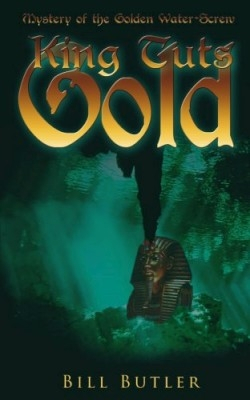King Tut's Gold
Mystery of the Golden Water-Screw
True wisdom is less presuming than folly. The wise man doubteth often and changeth his mind; the fool is obstinate and doubteth not; he knoweth all things but his own ignorance. —Akhenaten
King Amenhotep IV the tenth Pharoah of Egypt’s eighteenth dynasty has a revolutionary religious view. Once in power he sets aside the traditional gods—the bread and butter for a powerful class of priests—in favor of the sun-deity Aten who is declared the One True God. The king now restyled as Akhenaten insists that all Egyptians convert. Nefertiti whose famous bust is in a Berlin museum makes the leap with him against the wishes of her father the high priest of Amen. The now-deposed high priest warns: “The people have always displayed their personal affections for one deity or another without the heavy hand of compulsion…”
King Tut’s Gold documents the turmoil that follows from the point of view of Ahmes VI a young but respected palace scribe. Ahmes is much more than a convenient source of narration. He watches out for threats against the Pharoah’s imperiled family. Warnings from the Nubian sage Catava are delivered to him through an enchanted amulet. The water screw of the novel’s subtitle operates in a cavern under Catava’s supervision somehow pulling molten gold from below the surface to be used as tribute to the Egyptians. Ahmes’ trips to Nubia show distinct differences between the two closely linked cultures. “…women warriors in body armor rode in on horseback. With a sword in one hand the cage doors were cut and the horses galloped away from the cages.”
The author is impeccably consistent with the best available historical record. He wants readers to understand what made this moment so unique and describes specific innovations tools and architectural details. The difficulty inherent in recreating three thousand-year-old speech patterns is unenviable. Highly formalized exchanges especially early in the book are two parts flattery and one part information. In royal circles there is much to lose by giving offense so perhaps the dialogue is generally appropriate to the place and the volatile time. However the superlatives are great and powerful beyond the imaginations of the most loyal and humble of beings under the great munificent rule of the all-merciful one-God.
Bill Butler teaches high school history in his hometown of Key West Florida. He played basketball for the University of Louisville and was a draft pick for the NBA’s Atlanta Hawks and the ABA’s Kentucky Colonels after earning degrees in political science and education.
King Tut’s Gold covers much of the same subject matter as 1988 Nobel Prize winner Naguib Mahfouz’s Akhenaten: Dweller in Truth. Both novels are told from the point of view of idealistic young scribes although Butler’s approach is of his own creation. Those with a new interest in the history of the Egyptian Empire or early religious intolerance will find this fact-based fiction an accessible starting point.
Disclosure: This article is not an endorsement, but a review. The publisher of this book provided free copies of the book and paid a small fee to have their book reviewed by a professional reviewer. Foreword Reviews and Clarion Reviews make no guarantee that the publisher will receive a positive review. Foreword Magazine, Inc. is disclosing this in accordance with the Federal Trade Commission’s 16 CFR, Part 255.

